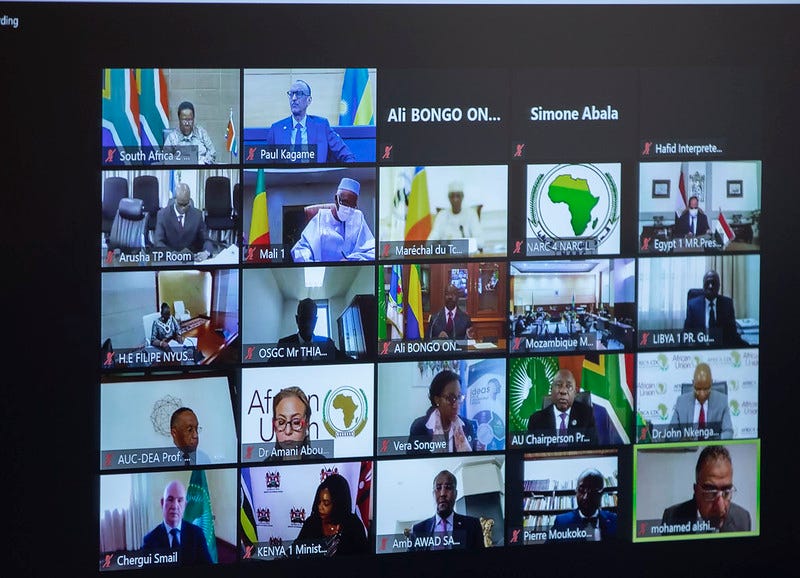Coronavirus on the menu of Regional Economic Communities meeting
RegionWeek Newsletter Vol III, Issue #137 | Thursday, October 22, 2020
This is a new version of the RegionWeek Newsletter for the 3rd season( July-December 2020). The content targets Business leaders, Decision-makers, and Young professionals with interests in Burundi and East Africa. Subscribe to stay productive, and competitive in a pandemic and disrupted season.

Dear Readers
This Thursday the African Union held the 2nd Mid-Year Coordination meeting between AU and Regional Economic Communities. A virtual meeting attended by President Cyril Ramaphosa, President Paul Kagame, and East African Community Secretary-General Amb. Libérat Mfumukeko.
Participants stressed that sharing of responsibilities between the African Union and regional organizations is one of the key issues in the struggle for change.
The meeting focused on the achievements of regional organizations in Africa and the achievements of the continent in general, especially in these difficult times of the COVID-19 epidemic.
The East African Community example on how member states have worked together to establish and ratify agreements that support cross-border trade during the COVID period, was shared noting the state-of-the-art surveillance technology that has been introduced to monitor long-distance trucker’s crew and enable contact tracing. A system that allows Partner States to electronically share truck drivers’ COVID-19 test results; therefore, minimizing the need for multiple COVID-19 tests on a single trip.
It was once again noted that the East African Community continues to make significant strides in the implementation of cross-border integration and compliance with the Common Market Agreement.
Africa's current integration landscape contains an array of regional economic communities, including eight recognized as the building blocks of the African Union. These eight are namely: AMU, CEN-SAD, COMESA, EAC, ECCAS, ECOWAS, IGAD, and SADC.
Regional Economic Communities have the immense challenge of working with governments, civil society, and the AU Commission in raising the standard of living of the people of Africa and contributing towards the progress and development of the continent through economic growth and social development.
IN THE REGION
Multilateral development finance institutions have pledged to sustain COVID-19 pandemic mitigation collaboration to accelerate the recovery of economies and livelihoods.
On Wednesday, a meeting, chaired by Hajjar Bandar, President of the Islamic Development Bank Group, attended by the heads of 12 Multilateral Development Banks (MDBs). The multilateral development finance institutions pledged to continue to collaborate in their efforts to mitigate the adverse impact of the COVID-19 pandemic and accelerate the recovery of economies and livelihoods.
They discussed how to achieve maximum impact in their relief efforts and the debt sustainability of beneficiary countries. Especially the impact of their responses to the pandemic and the worsening debt situation, the organizations said that sustaining their joint efforts would protect livelihoods, especially among vulnerable populations, preserve macroeconomic stability and promote a stronger private sector role after COVID-19.
The joint effort of the MDBs has seen a COVID-19 response envelope of about $230 billion. In addition, the IMF has provided financing to 81 member countries totaling over $100 billion since mid-March, with further room for member countries to tap into its $1 trillion lending capacity through program arrangements.
The African Development Bank Group introduced a COVID-19 Response Facility (CRF) of up to $10 billion to support Regional Member Countries and private sector clients in their efforts to address the impacts of the COVID-19 pandemic.
President of the African Development Bank Group, Akinwumi Adesina, said collaboration among development partners has become more vital than ever to help economies recover from the pandemic and attract private financing to rebuild infrastructure.
“We are really…in very extraordinary times. There’s no doubt about it, in terms of the devastation that this pandemic is causing. The challenge is huge and the collective resolve must be strong as MDBs,” he said.
He said efforts must be deepened to help member states mobilize more domestic resources and attract private creditors to participate in financing capital projects.
Thanks for reading
Fabrice Iranzi, RegionWeek.com
Support RegionWeek Newsletter!
Contribute at least $5/Month, and join our amazing community of supporters!
RegionWeek is a Burundi-based media for a new generation of achievers in Africa, a platform devoted to chronicling the journey to Freedom and Empowerment.



